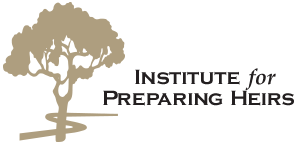Who Gets Grandpa’s Cufflinks?

Ignoring personal items as a part of the estate planning process can be costly, both financially and emotionally.
Not all client families own celebrity art or rare collections. But most families have personal items, regardless of financial value, with special meaning to individual family members, or the family as a whole. Yet for many families, the conversation about what to keep, sell and/or donate is often avoided until the passing of a loved one, or at the suggestion of a trusted advisor.
The Importance of Family Conversations About Personal Items . . . Before Wealth Transfer
On the financial side, families who overlook tangible assets of value as part of the estate planning process may not be aware of potential tax exposure from appreciated assets or how to take advantage of strategies for maximizing deductions.
On the emotional side, who gets grandpa’s cufflinks – or other sentimental items – can have a lasting impact on family harmony. It’s not always an easy conversation for family members to have. No one likes to talk about the time when a beloved family member passes. Yet, these conversations can bring a family closer together. On the flip side, avoiding the conversation, and the ultimate disposition of items, can cause riffs between family members who feel left out of the decision-making process.
The Role of the Trusted Family Advisor®
Trusted Family Advisors who have training and tools, understand the benefits to generational families of having soft-side conversations that help prepare the family for a successful wealth transfer. The disposition of a family’s personal items is an important conversation all families would benefit from having with the guidance of their advisor.
For the advisor, it’s also an opportunity to share with the entire family what the advisor does for the family today and how the advisor can serve future generations. Studies show that advisors who connect with the heirs, including spouses, are more likely to be retained post-inheritance.
Helpful tips to offer client families:
• Hold a family meeting where the wealth creator (matriarch and/or patriarch) shares stories about the meaning and history of personal items
• Involve family members in the decision-making process of what items to keep, sell and/or donate when the time is right. This will help avoid potential family disputes over the distribution or sale of particular items
• Keep an up-to-date inventory of all tangible assets
• Maintain current appraised values
• Ensure collections are adequately insured through a home policy or specialty art insurer
• Consider adding an Art Advisor to your team of professional advisors
The Role of Art Advisor
A family’s art collection is often among the most valuable assets that they own, and yet it is often overlooked as part of the overall estate planning process. Not only are there financial implications to the disposition of art assets in terms of federal income, estate and gift taxes, but also potential emotional costs arising from an inequitable division of cherished art pieces.
Along with the Trusted Family Advisor®, the Art Advisor is but one part of a well-chosen advisory team that takes the family dynamic into account when planning with art assets.
“Whether the family inherited works of art or they built a collection over a number of years, market trends and values change over time and collectors often don’t know how to evaluate what they own, said Robin Kalota, Art Advisor, and founder and principal of Plan Art LLC, a firm that helps families determine planning options for their art assets.
According to Kalota, the role of the Art Advisor is to help clients make educated decisions, whether they are acquiring, selling or managing their existing art collections. “Art advisors help collectors navigate the art markets, identify current trends and gain access to specialists. Importantly, they help clients recognize the financial and emotional value of their art holdings.”

